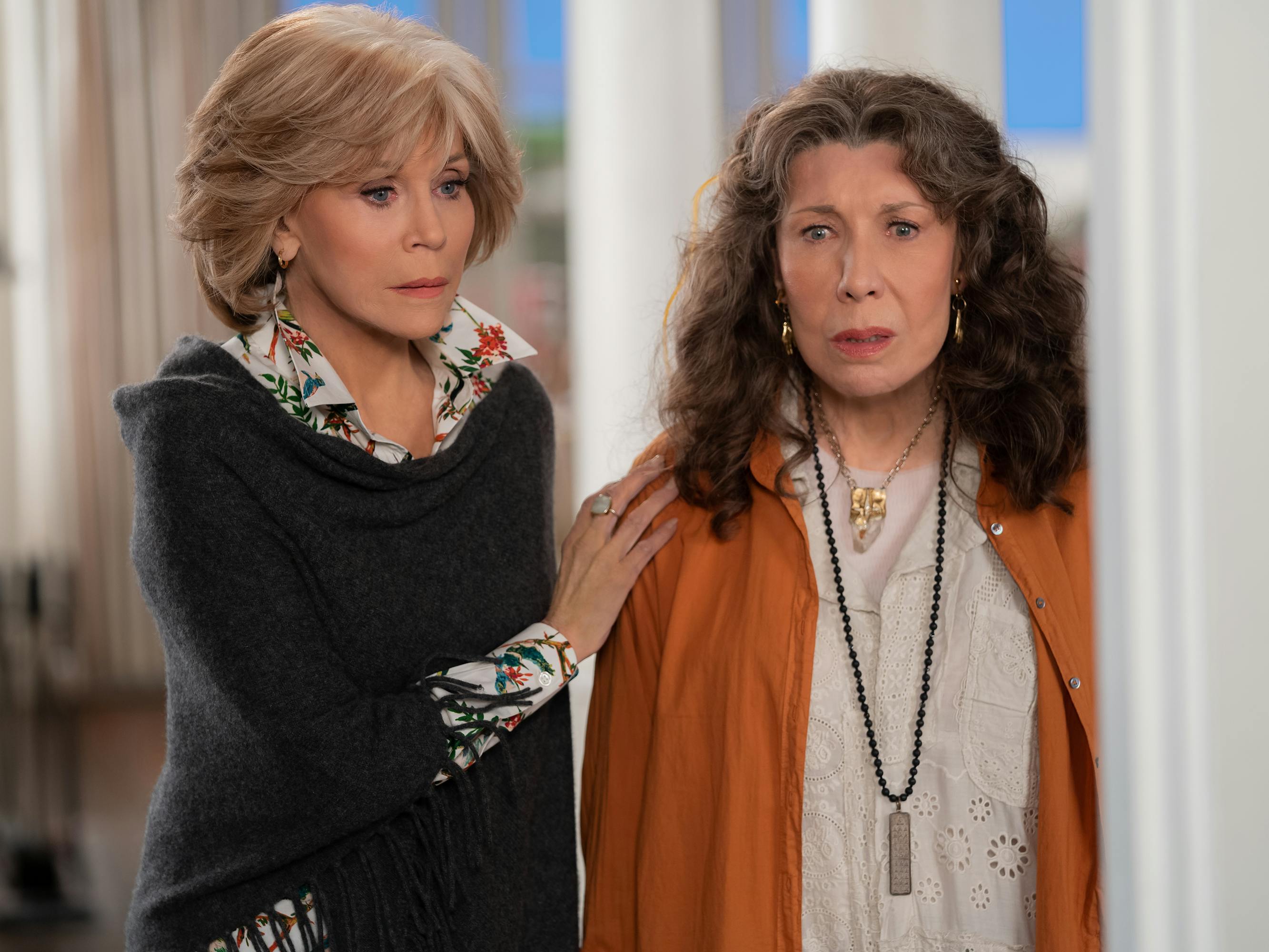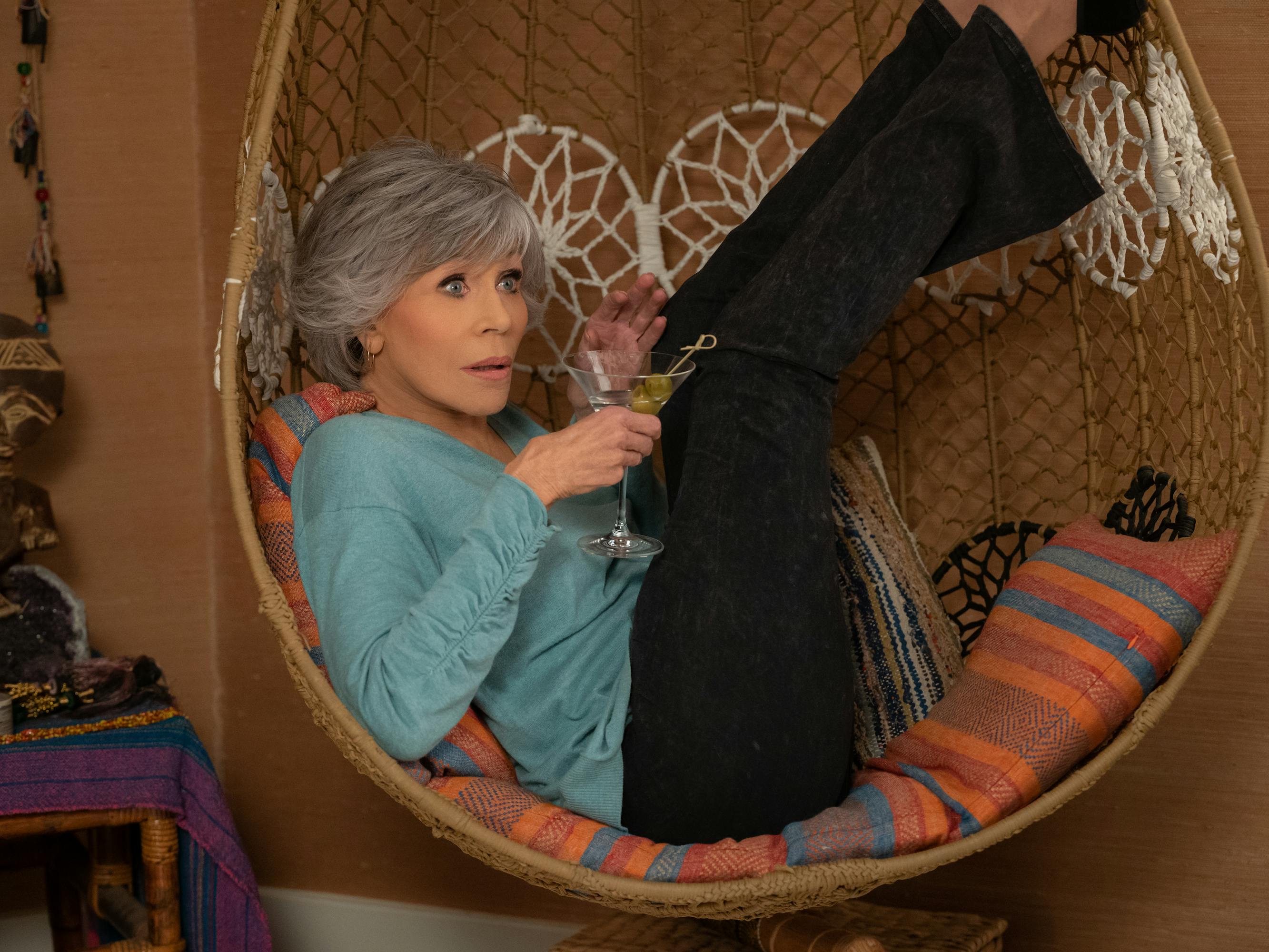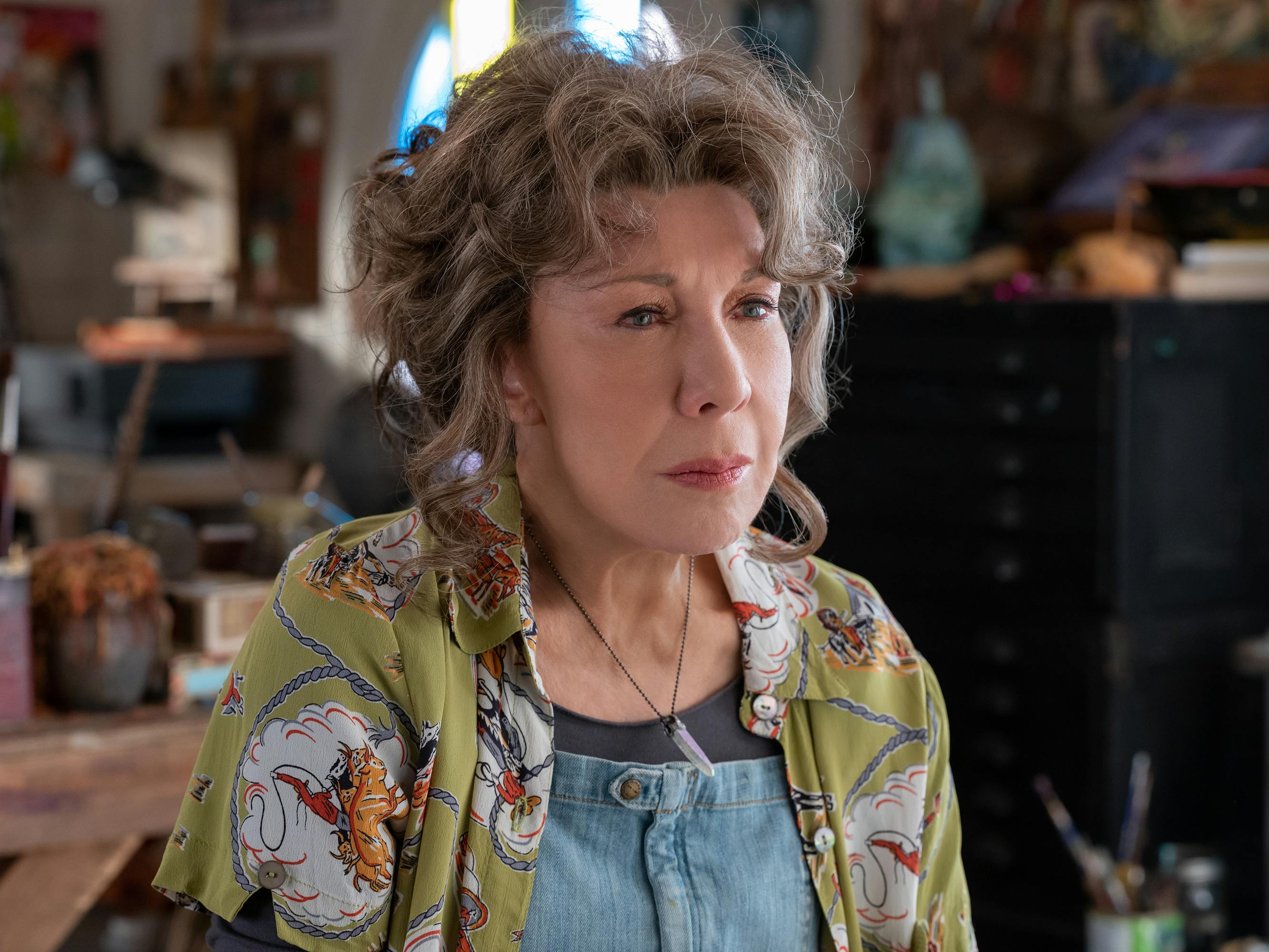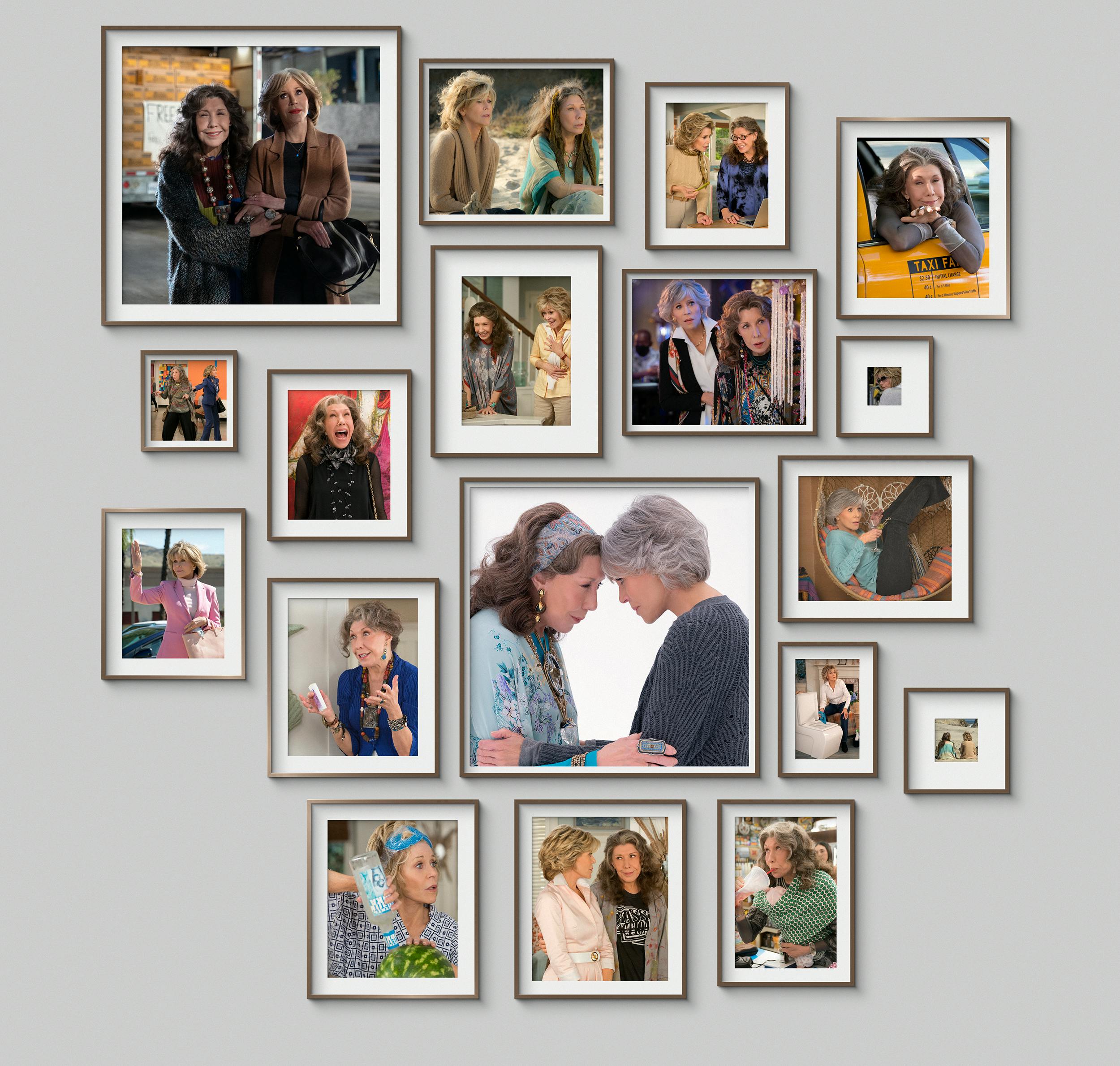The legendary women behind the groundbreaking show Grace and Frankie look back on its final season.
Few performers can lay claim to the title of “icon” in the same way Jane Fonda and Lily Tomlin can. Between them, the actors, authors, and activists have too many accolades to tabulate, and their respective work in film, television, and theater has left an indelible imprint on American culture. Together these women are even more formidable, and that combustible chemistry helps account for the remarkable success of their inventive, addictive series Grace and Frankie.
Hailing from Friends producer Marta Kauffman (a television icon in her own right), Grace and Frankie paired its luminous leads as Southern California roommates who learn that it’s never too late for a little self-reinvention. Thrown together after their husbands reveal that they’ve been carrying on a romantic relationship for years, traditional Grace and free-spirited Frankie find themselves facing an uncertain future, side by side.
Over seven hilarious, heartfelt seasons, the BFFs embarked on a comedic adventure involving vibrators, Shark Tank, health scares, hangovers, and all manner of romantic tumult. “When we started, we weren’t sure what the show was going to be,” Kauffman tells Queue. “We had to find the line between comedy and drama, but story-wise, it kept evolving. It took a lot of discovery.”
The series itself was something of a discovery for audiences as well — first lauded by critics, then embraced by older viewers, it eventually became a favorite of the Millennial and Gen Z set. Even SNL superstar Pete Davidson rapped about his affection for the show in a viral clip that featured cameos from Fonda and Tomlin. You can’t buy that kind of publicity.
With Grace and Frankie having recently completed its acclaimed seven-season run, Fonda, Tomlin, and Kauffman gathered to reflect on the experience of making 94 episodes of the Emmy-nominated series. They also shared their thoughts on the deeply moving finale, which features a long sought-after guest star: Dolly Parton, Fonda and Tomlin’s co-star from the groundbreaking 1980 workplace comedy 9 to 5. “All the times that she was too busy [to guest star in the earlier seasons], it was for a reason,” Kauffman says.

Jane Fonda and Lily Tomlin
Krista Smith: Why do you think Grace and Frankie has been so successful?
Lily Tomlin: What we know from [fans] is that they saw a chance at continuing life. Life’s not over at a certain age. Being an older woman is not what society would have us think it is. Women should not be marginalized. They’re totally active, fully human beings, and that was gratifying to an audience of both young and older people. It was just amazing to us that people responded to this show.
Jane Fonda: I’ve had a number of women — and Lily has too — who’ve come up to me [with stories]. One woman’s sister, her husband actually did come out as gay and leave her. And the sister was suicidal. So she advised her sister to start watching Grace and Frankie, and it saved her life. These two women went through a trauma that’s hard to understand. After 40 years of marriage to a man, to suddenly be told that he’s gay and he is going to marry his [business] partner . . .
Tomlin: Who’s married to the other woman.
Fonda: It’s like having the rug of your whole identity pulled out from under you. Who am I? How could I have not understood and seen? And the fact that we not only survived — these two women who really didn’t like each other — but then became friends and thrived, I think that brought hope to a lot of older women. I think the grandkids like to watch it with their grandparents because they see another side of old life for a woman. It’s like, Oh my gosh, they still get it on. And they still have fun.

Jane Fonda
Marta Kauffman: I’ve heard a lot of young women say how grateful they were to see what it might be like for them in the future, even things like dry vaginas. But the most important piece is that it’s aspirational. It’s a show about [how] you can do anything at any point in your life; that is something we all want to identify with. That doesn’t mean only when you turn 75 — it also means when you leave college, when you get married, when you get a divorce, when you have a baby; it’s all about starting again. The show is, at its core, very warm and welcoming, and you want to know these people and be part of their lives.
Marta, when we last spoke, we talked about the origin of Grace and Frankie. I’d love for you to talk about what you have learned in the last seven years working with Jane and Lily, writing for them and being part of this giant success. What has it meant for you personally?
Kauffman: Honestly, it’s been an incredibly fulfilling experience. And maybe this is getting a little too personal, but after Friends, you wonder, Can I do anything else? Is there another show in me that will have any impact whatsoever? It was an incredible learning experience for me as a writer and a showrunner [to] separate from [Friends co-creator] David Crane; that was a big thing. But I also have to say: Working with Jane and Lily changed my life. They are so good at what they do. They are such incredible professionals and their thoughts are so observant and have always helped the scripts. I learned so many lessons about how to think about writing from a character’s perspective. It’s an incredibly exciting challenge to figure out as quickly as you can exactly what line this show walks.
Jane, Lily, was there something that you learned from one another during this process?
Tomlin: I learned from Jane that you get yourself together and you just do it, no matter how you feel or what you’re thinking. I got a lot of courage from her, but I’ve known that for years. I once presented an award to her, and I said, “Jane has an examined life, and I’ve not examined mine — so I’ve just piggybacked with hers.” Plus, it’s just fun. I love Jane. I so admire her, and to have her as a great cast member and colleague and pal, it means a lot.
Fonda: And Lily is extremely present in the moment. It’s wonderful to work with somebody who never phones it in. She really cares. Whether it’s a physical thing that she has to do or whatever, she works deep and hard. It’s a wonderful inspiration to be working alongside that.

Lily Tomlin
Could you take me through what that last shoot week was like? Just seeing that last episode come together and finally getting Dolly Parton to appear — when she spins around in the chair, I gasped on my sofa at home watching it.
Fonda: We’ve tried since the very beginning to get her to [guest star]. But it’s kind of great that it was for the last [episode].
Kauffman: I was directing the last episode, so I got to be inside the whole thing. There’s this constant feeling of, Oh my God, it’s the last time we’re going to use that set. You want to slow down time a little bit. The last shot we did was with Jane and Lily, which felt perfect, to end with just the two of them. It was beautiful and bittersweet, and so incredibly sad. We had this functional family, a very happy crew and group of writers and cast, and we all got along. All you can think as you’re doing the last few shots is, I’m going to miss this so much. [But] it was fantastic meeting Dolly. It was one of the great moments of my life. She’s so tiny. She wears four-inch heels all the time. Besides getting the opportunity to direct her, my favorite moment was at the very end. We wanted to take a picture, and she said to me, “Come here, you old hippie.” It might be one of the high points of my life.
Are you at all surprised by the longevity of 9 to 5?
Tomlin: Oh, I’m floored by it. When the three of us came out at the Emmys a couple of years ago, we were the highlight of the evening. They were so excited to see us all together again. It’s constantly referred to as a touchstone for so many people, and everything in it is still relevant.
Fonda: One of my favorite lines is [Tomlin’s] line: “I killed the boss. You don’t think they’re going to fire me for that?”
Tomlin: And Dolly, that was her first movie. Jane [who co-produced the film] had the courage to cast Dolly and me. She just kept after us.
Fonda: Took me a year to persuade them.
That’s what we love about you, Jane Fonda — you don’t give up.
Tomlin: No, she doesn’t.
Fonda: When I do, you don’t know about it.
